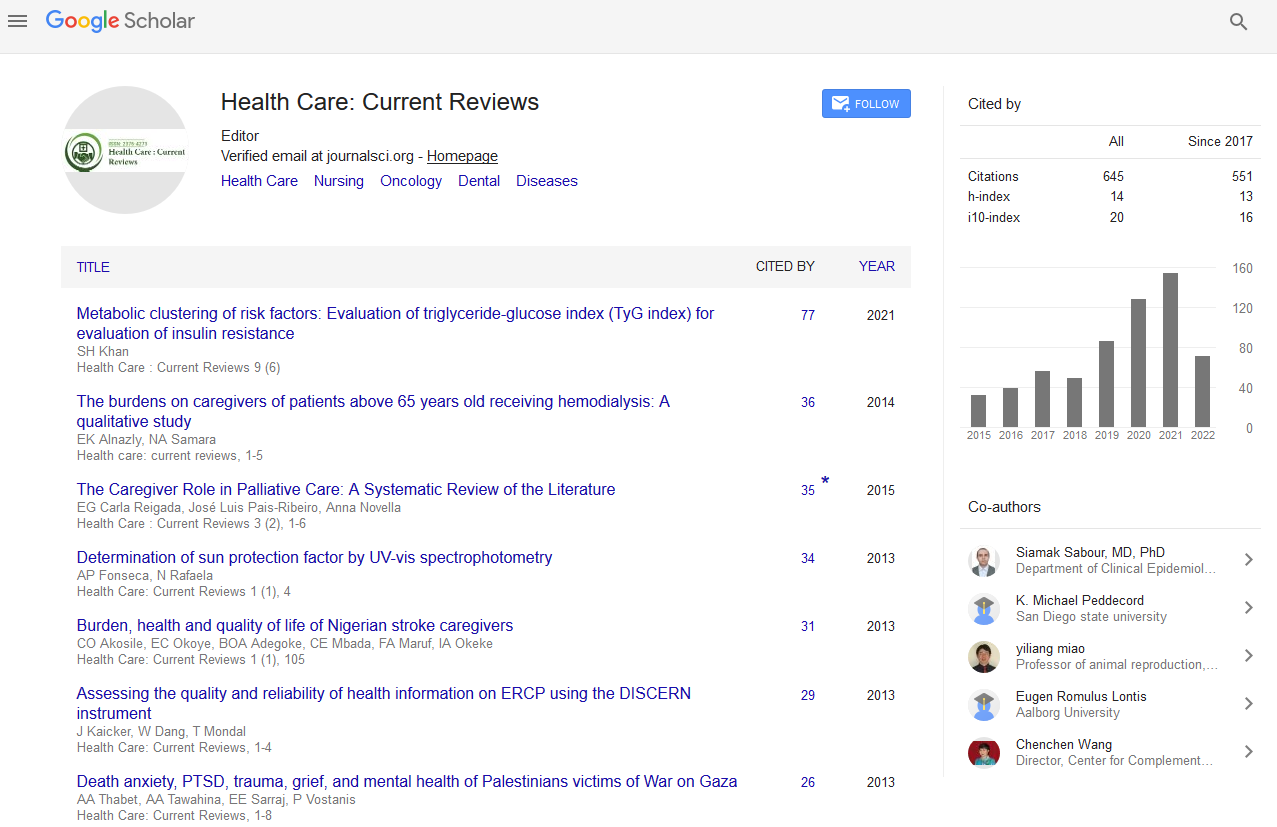PMC/PubMed Indexed Articles
Indexed In
- Open J Gate
- Academic Keys
- RefSeek
- Hamdard University
- EBSCO A-Z
- Publons
- Geneva Foundation for Medical Education and Research
- Google Scholar
Useful Links
Share This Page
Journal Flyer

Open Access Journals
- Agri and Aquaculture
- Biochemistry
- Bioinformatics & Systems Biology
- Business & Management
- Chemistry
- Clinical Sciences
- Engineering
- Food & Nutrition
- General Science
- Genetics & Molecular Biology
- Immunology & Microbiology
- Medical Sciences
- Neuroscience & Psychology
- Nursing & Health Care
- Pharmaceutical Sciences
Association of cytotoxic T-lymphocyte antigen-4 (CTLA4) gene variants with non-dermato malvitiligo
Euro Health Care and Fitness Summit
September 01-03, 2015 Valencia, Spain
Yaswanth Ala1, Raja Narasimha Rao2 and Parveen Jahan3
1Osmania University, India 2South Central Railway Hospital, India 3Maulana Azad National Urdu University, India
Posters-Accepted Abstracts: Health Care: Current Reviews
Abstract:
Background: The cyto-toxic T lymphocyte antigen4 (CTLA4) is a negative regulator of T-cell function and encodes a surface molecule with inhibitory effects on activated T cells. Variation in CTLA4 gene has been genetically associated with a number of autoimmune diseases including vitiligo, an acquired pigmentary disorder resulting from loss of melanocytes. Aim: The present study is aimed at investigating the role of functional polymorphisms of CTLA-4 gene (rs11571317C>T, rs231775A>G and rs5742909C>T) in susceptibility to vitiligo. Methods: Genotyping was performed by PCR-RFLP and ARMS-PCR in a total of 410 subjects (200 vitiligo patients and 210 normal healthy controls). Data was subjected to appropriate statistics. Results: The two polymorphisms rs11571317 and rs5742909 showed a significant association with vitiligo. The multifactor dimensionality reduction (MDR) analysis of CTLA-4 gene revealed a strong synergy between rs11571317 and rs231775. The two locus model (rs11571317 and rs5742909) and three locus model (rs11571317, rs231775 and rs5742909) was observed to be the best models (with cross validation 10/10) showing the two fold and three fold increased risk respectively towards vitiligo (OR: 2.0, 95% CI: 1.3-3.2 and OR: 3.3, 95%CI: 2.16-5.17respectively). By Multiple logistic regression analysis gender and rs231775 showed the significant variation (p<0.05). Haplotype blocks C-A-T and T-G-C conferred significant protection (OR: 0.42, 95% CI: 0.23-0.78, p=0.005 and OR: 0.48, 95% CI: 0.26-0.88, p=0.018 respectively) and C-G-C a two-fold increased risk towards vitiligo (OR: 1.72, 95% CI: 1.04-2.86, p=0.036). Conclusion: Our findings suggest the role of CTLA-4 in the vitiligo pathogenesis and for the first time we report the association of rs11571317 and rs5742909 polymorphisms in relation to vitiligo.
Biography :
Yaswanth Ala has completed his Master’s in Biotechnology from Osmania University and pursuing PhD in Genetics. He is a member of Indian Immunology Society and presented more than 10 papers in national and international conferences.
Email: yashwanthala@gmail.com


